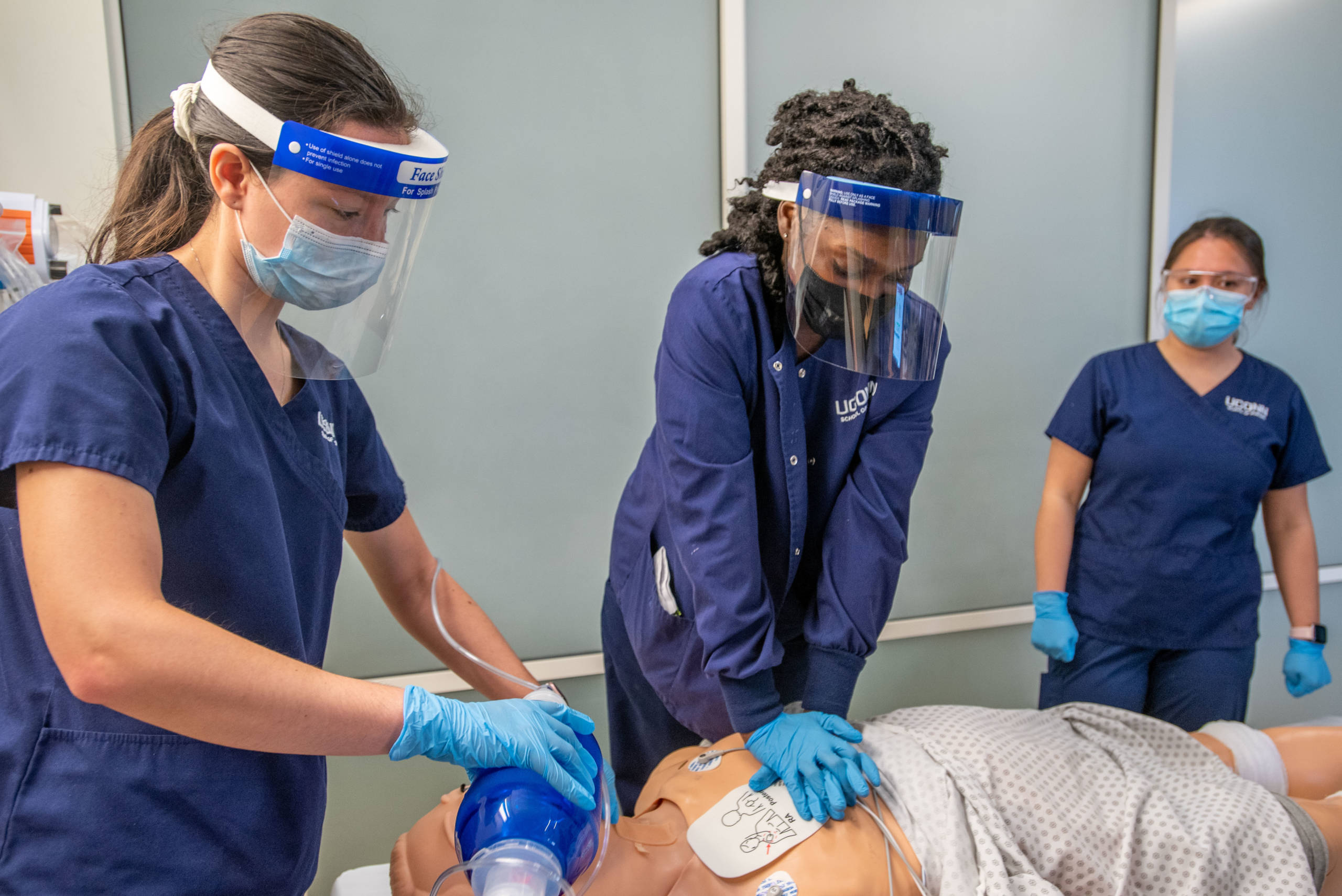In Celebration of Women’s Philanthropy, Nurses Lead the Way
4 min read

When UConn’s Women and Philanthropy program launched its 100 Women Giving $100,000+ initiative, it was nurses who led the way in this celebration of female philanthropists and allies who support any area of the University. Anne Harrington ’89 (NUR), Bertie Chuong ’82 MS, and Nancy Miner ’73 (NUR), ’78 MS are among the nursing alumnae to earn recognition as part of this initiative.
Harrington says it was a natural decision to give back to the school that gave her so much. After working in a hospital setting, she worked as a community health nurse for the Visiting Nurse Association of Boston, where she discovered her passion. She worked for two start-up home care agencies before branching out to cofound a new company in 1999, providing nurse assessments and ongoing elder care coordination primarily in the long-term care insurance industry.
When Harrington and her partner sold the business in 2016, she reflected on her career path and how she got to where she is—and realized UConn played a big role.
“A large part [of my success] was due to my experience at the School of Nursing,” Harrington says. She established a bequest to create the Anne M. Harrington Scholarship, which will provide support for full-time undergraduates in the School of Nursing.
“I had student loans and worked through college, and I wanted to share my success to alleviate some stress for undergraduates in the same situation,” she says.
For Chuong, it is a lifelong love of learning that inspired her to give to UConn’s School of Nursing.
“There is no shortage of things to learn about in life, and my two years at UConn were fabulous learning years,” Chuong says. “One dean after another has provided ever-improving leadership at the School of Nursing, and UConn gave me a really good feeling for nursing in the state.”
After a career focused on critical care, Chuong says she “was challenged to stimulate [her] brain” by going back to school for her Doctor of Nursing Practice, which she earned in 2016. She then went into nursing education, combining her love of nursing with a passion for education.
Chuong says the pandemic, while horrible, has forced educators to think about doing things differently through technology—and that’s a good thing for UConn, as it inspires innovative thinking for the program that will benefit the school beyond the pandemic.
“Simulation, for example, is something I’ve been so keen on ever since the first robot I saw, and I was in awe the last time I was in UConn’s sim lab,” she says. “I think it will be a real teaching method in the future—as close to hands-on training as you can possibly get.”
Chuong established the Bertie Chuong Endowed Fund for Nursing to provide support for cutting-edge technology at the School of Nursing. Another benefit to this type of learning? According to Chong, “It’s fun. Our learning needs to have fun with it, to be creative and innovative. UConn is already a jump ahead.”
Miner gives to UConn as a way to express appreciation for the school that set her on her career path.
“If it wasn’t for the School of Nursing, I wouldn’t be doing what I’m doing,” she says. “I have the deepest gratitude.”
Miner devoted her professional life to psychiatric nursing, working in hospitals and as a surveyor in Connecticut and beyond. She has also taught at UConn’s School of Nursing and other nursing programs around the state, and in 2017 she started her own consulting business.
“Sometimes I’m asked about retiring,” Miner says. “But this is a gift that I have to help all these people with serious mental illnesses. Why would I stop doing that?”
Miner was already contributing to a nursing scholarship when she decided she wanted to do something more for the School of Nursing. She established the Miner Bell Foundation Endowment for Nursing to provide support for faculty and students specifically in the area of psychiatric nursing. She hopes that this endowment will make a real difference for UConn students interested in psychiatric nursing, who will then go out and make a difference in the world.
“I wanted to support this area because the mentally ill are the most disenfranchised people in our nation, yet there are not enough psychiatric nurse practitioners,” Miner says. “These patients need help the most and I am happy to be able to help with that.”
Though not a nurse herself, Karen Maguire ’68 (CLAS), ’71 MA, ’81 Ph.D. also supports UConn’s School of Nursing. Maguire says that UConn empowered her to invent her own program as a student, studying topics ranging from English and modern languages to political science and economics.
“UConn was very good to me in so many different ways,” she says. “The University allowed me to pursue a really interesting education.”
When considering how best to give back to the University, Maguire says she chose to support the School of Nursing because she understands the importance of educating future generations of nurses.
“I’m painfully aware of the shortage of doctors, nurses, and med techs that we have today, especially after COVID,” explains Maguire. “I want to make sure there’s a steady supply [of nurses].”
Maguire contributes to the Nursing Scholarship Fund and the School of Nursing Dean’s Fund, and says she wasn’t surprised to hear about the generosity of nurses such as Harrington, Miner, and Chuong.
“Nurses understand how important [giving back] is, just as I understand it as a patient,” she says.
Harrington, Miner, and Chuong agree. Harrington says it is in the nature of nurses to want to help others.
“Nurses are giving people, we’re caring,” she says. “We’re also an intelligent group of problem solvers. Fortunately for institutions, we can give back. It speaks a lot to our profession. We’re not just bedside nurses. We’re innovators and we’re leaders.”
Miner says giving is just what nurses do. “We are caregivers. We are always going to step up to the plate when there’s a need.”
“It doesn’t surprise me, but it does amaze me,” Chuong says. “Nursing salaries aren’t where they need to be, but nurses are committed, and once they commit to something they will figure it out.”
“I want the School of Nursing to continue to improve; I want to make sure that the University continues to succeed,” says Harrington. “It’s not just about giving money; it’s about supporting an organization that gave you so much and making sure they maintain that level of excellence.”
